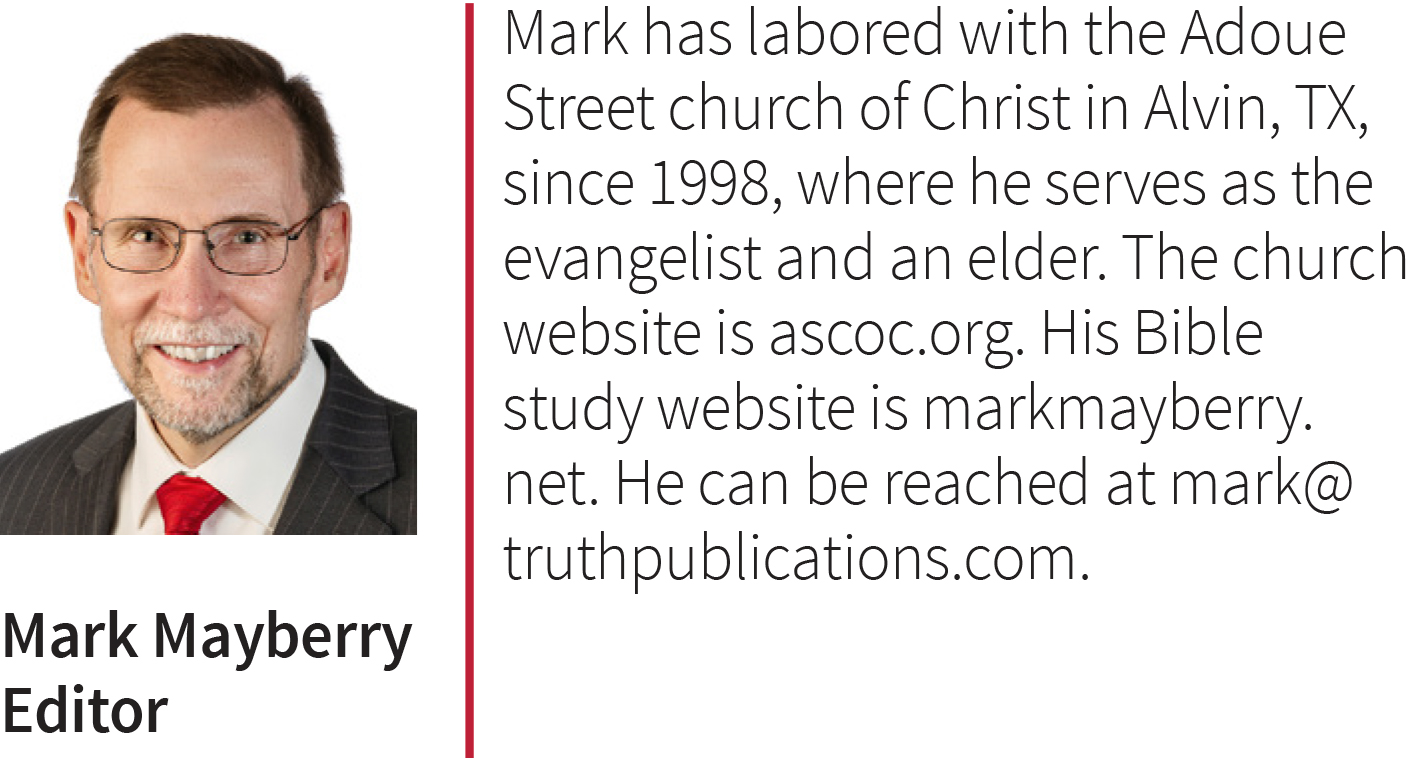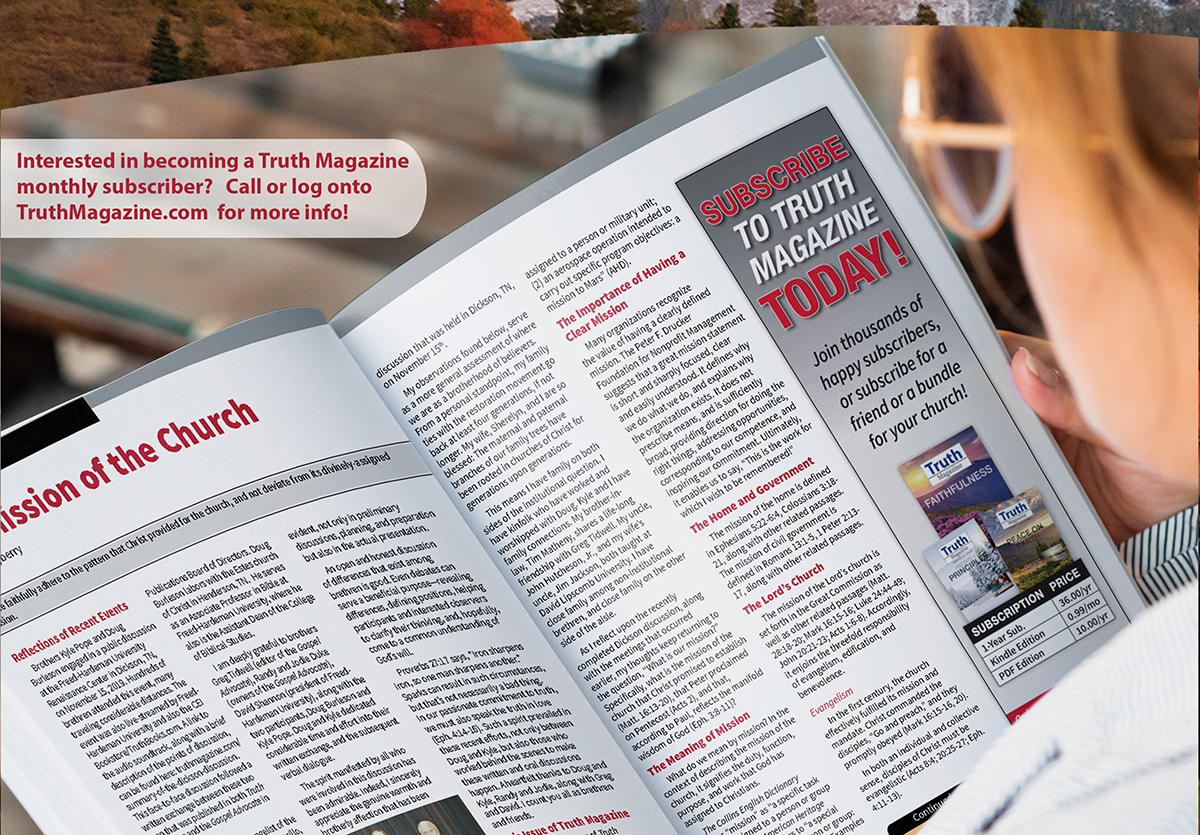
by Mark Mayberry
Synopsis: As protests and riots have buffeted our nation, the fabric of society has frayed. Many now question the assumptions that bind us together. Yet, Christ is the answer to societal ills, and He calls us to spiritual unity.
Since its beginning, our nation has viewed itself as a melting-pot. However, the concept of “E Pluribus Unum,” i.e., “Out of the many, one,” is under assault. Today, modern society is being threatened by a renewed emphasis on tribalism.
In some ways, the results have been silly; in other ways, they have been tragic. Consider the outcry against cultural appropriation. You can’t enjoy pizza unless you are Italian. Don’t order a breakfast burrito unless you are Hispanic. Recall the conflict that has recently occurred in Portland, in which Black Lives Matter supporters, and Antifa anarchists have engaged in continuous rioting. For a time, a Wall of Moms attempted to protect these supposed “peaceful protesters,” enjoying their fifteen minutes of fame, until the “WOMbat” movement was ripped asunder by infighting because it was deemed too white.
The spirit of tribalism is probably the default, defensive position of humanity: “My family. . . my village. . . my tribe. . . my nation. . . my culture. . . versus the enemy (real, perceived, or potential). Yet, God provides something better.
Sacred Scripture affirms that we share one ancestry: “Do we not all have one father? Has not one God created us?” (Mal. 2:10). All humanity descended from Adam (the first man) and his wife, Eve, who is “the mother of all the living” (Gen. 3:20).
Although God destroyed the world through the flood, the earth was repopulated through the sons of Noah (Gen. 9:7, 19). Genesis 10-11 describes how Noah’s descendants separated into their respective lands and languages, according to their families, and into their nations (Gen. 10:5, 32).
After confusing the languages at Babel, the Lord scattered mankind over the face of the whole earth (Gen. 11:8-9). Subsequently, the cultural, ethnic, and physical characteristics of these isolated groups became more pronounced. Nevertheless, despite our diversity, we share a common origin (1 Cor. 15:39), a common hope (1 Cor. 15:45-49), and a common purpose (Acts 17:24-28).
This biblical view of origins starkly contrasts with Darwinian evolution, which is rooted in racism. The full title of Charles Darwin’s famous work is The Origin of Species by Means of Natural Selection—or The Preservation of Favoured Races in the Struggle for Life. Furthermore, his writings leave no doubt regarding the identity of “favored races” and those he deemed inferior (Descent of Man, 105).
God has a plan for all humanity. Consider His three-fold promise to Abraham involving a land, a nation, and a seed (Gen. 12:1-3). This promise was repeated to Isaac (Gen. 26:4-5) and Jacob (Gen. 28:14) and realized through Jesus Christ (Acts 3:24-26; Gal. 3:8).
The gospel is for all (Rom. 1:16-17). Giving the great commission, Jesus said, “Go into all the world and preach the gospel to all creation. . .” (Mark 16:15-16). Disciples of Christ come from all nations (Matt. 28:18-20). Repentance for forgiveness of sins would be proclaimed in His name to all the nations (Luke 24:45-47).
The gospel contains universal promises to “everyone who believes” (John 12:46; Acts 10:43; 13:39; Rom. 1:16; 10:4). It also contains uniform judgment for those who do evil (Rom. 2:9-11). All who accept the rule of Christ must undergo a genuine transformation, with full repentance and a complete reorientation of their lives (Col. 3:1-17).
If one belongs to Christ, cultural, ethnic, economic, racial, and gender distinctions become insignificant (Gal. 3:28-29; Col. 3:11). Consider the amazing diversity of the church in Antioch: “Now there were at Antioch, in the church that was there, prophets and teachers: Barnabas, and Simeon who was called Niger, and Lucius of Cyrene, and Manaen who had been brought up with Herod, the tetrarch, and Saul” (Acts 13:1). The name Barnabas is probably of Aramaic origin. Simeon (of Semitic origin) was also called Niger (i.e., a Latin word meaning black, or dark-complexioned). Lucius (of Latin origin) was from Cyrene, a city on the north coast of Africa. Manaen (of uncertain origin) had been brought up with Herod, the tetrarch, which is suggestive of high rank.
Before closing, let’s grapple with some difficult questions, namely, (1) What about generalizations? (2) What about prejudice?
Sometimes the Bible makes generalizations, but these are based upon character, not external characteristics. Consider denunciations of the daughters of Zion (Isa. 3:16-17), the nations of Israel (Isa. 9:17) and Judah (Jer. 13:23-24), the Moabites (Isa. 16:6-7; Jer. 48:29), and the inhabitants of Crete (Titus 1:12-14). In every case, God’s word reveals widespread societal shortcomings; yet, individual exceptions are noted—a remnant remains (1 Kings 19:14, 18; Isa. 10:20-22). While the Moabites may have been excessively proud, Ruth exhibited a humble spirit (Ruth 1:16-17).
In writing to Titus, Paul generalizes concerning the inhabitants of Crete: “One of themselves, a prophet of their own, said, ‘Cretans are always liars, evil beasts, lazy gluttons.’ This testimony is true. For this reason reprove them severely so that they may be sound in the faith, not paying attention to Jewish myths and commandments of men who turn away from the truth” (Titus 1:12-14).
What were the Cretans like? Consider the following observation from Nelson’s New Illustrated Bible Commentary: “Paul is quoting the Cretan poet Epimenides, who wrote these words around 600 B.C. The Cretans were so much regarded as liars in the Mediterranean world that the expression ‘to Cretanize’ meant to lie” (Radmacher, 1624).
Similar statements could be made about other ancient cities, such as Corinth, and also Sodom and Gomorrah. According to Collins Dictionary, to “Corinthianize” was a term synonymous among the ancients with licentiousness. The temple of Aphrodite on the Acrocorinthus had a thousand consecrated prostitutes, and the very expression, “to Corinthianize,” was suggestive of immorality (Robertson, Word Pictures, Acts 18:1). The ancient cities of Sodom and Gomorrah remain synonymous with homosexuality, and the sinful act of sodomy.
We can rise above our environment and the baggage of our past. Modern progressives argue that people are defined by their culture and caste, by gender and race, by ethnicity and economic advantage. In contrast, however, the Lord affirms that we will be judged individually, based upon our character and commitment to walk in His ways (2 Cor. 5:10; Rev. 20:11-15).
The Good Samaritan teaches that our compassion should reach across cultural, ethnic, and even religious lines (Luke 10:30-37). Paul’s rebuke of Peter’s prejudicial behavior at Antioch indicates that such conduct within the fellowship of believers is sinful (Gal. 2:11-14). Our Savior broke down the middle wall of partition that separated Jew and Gentile (Eph. 2:11-16). Anticipating the conversion of the Gentiles, Jesus said, “Many will come from east and west, and recline at the table with Abraham, Isaac, and Jacob in the kingdom of heaven. . .” (Matt. 8:5-12). This harmonizes with the hope of the prophets (Isa. 2:2-3; 49:6, 12; 52:10; 59:19; 60:1-6; Mal. 1:11; etc.).
Are you part of the one flock? Are you a member of His one body? Have you submitted to the one baptism? Are you praising God with one voice? Jesus brings alienated humanity together so that all “will hear My voice; and they will become one flock with one shepherd” (John 10:14-16). He reconciles us in one body (1 Cor. 12:12-13). He calls us to obey one pattern (Eph. 4:4-6). He wants us to praise Him with one voice (Rom. 15:4-6). Be a faithful Christian. Openly accept all who make the same commitment. Focus on the heart, not the flesh; accentuate character, not complexion; emphasize principle, not pigmentation. Nothing else matters.
“Corinthianize.” Collins English Dictionary. HarperCollins Publishers, 2014. https://www.collinsdictionary.com/dictionary/english/corinthianize
“Sodomy.” Merriam-Webster’s Collegiate Dictionary. Springfield, MA: Merriam-Webster, 1996.
Darwin, Charles. The Descent of Man. UK: John Murray Publishers, 1871. https://charles-darwin.classic-literature.co.uk/the-descent-of-man/ebook-page-105.asp
Radmacher, Earl D., Ronald Barclay Allen, and H. Wayne House. Nelson’s New Illustrated Bible Commentary. Nashville, TN: Thomas Nelson Publishers, 1999),
Robertson, A.T. Word Pictures in the New Testament. Nashville, TN: Broadman Press, 1933.


